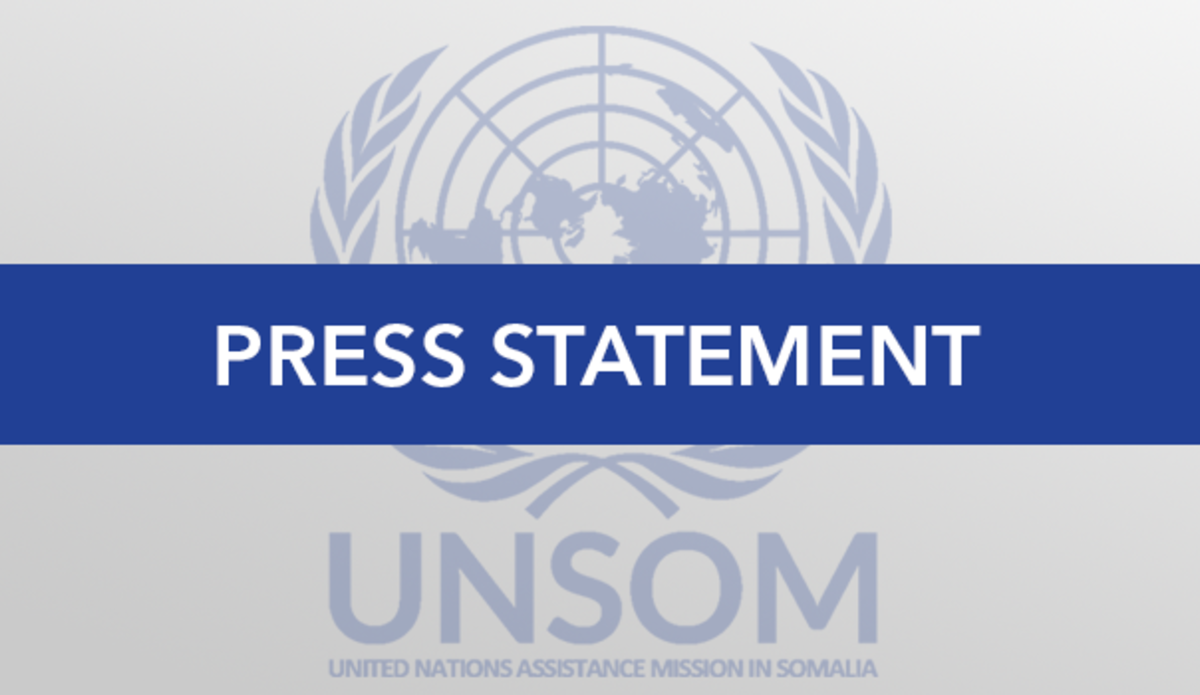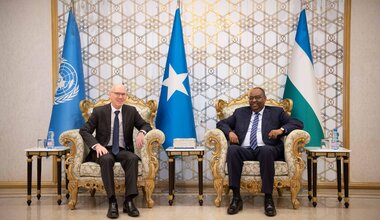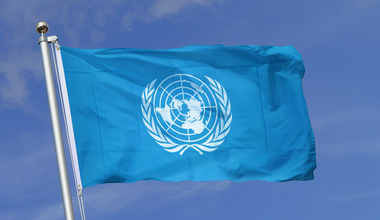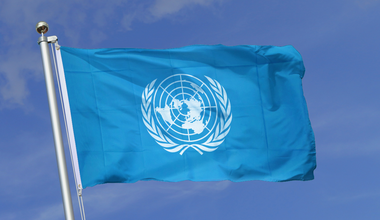Remarks by SRSG Nicholas Kay at the National Consultative Forum
H.E. The President of the Federal Republic of Somalia, Hassan Sheikh Mohamud, H.E. The Speaker of the Federal Parliament, Mohammed Osman Jawari, H.E. The Prime Minister of the Federal Republic of Somalia, Omar Abdirashid Ali Sharmarke, Presidents of existing and emerging Federal Member States[1], Members of Parliament, Ministers,Governors, Representatives of civil society, women, youth, Fellow Ambassadors, Ladies and Gentlemen,
It’s a great pleasure to be here.
I would first like to invite everyone present here to join me in warmly welcoming the new Special Representative of the Chair of the Commission of the African Union and Head of AMISOM, Ambassador Francisco Caetano Jose Madeira. I take this opportunity to reiterate my appreciation for AMISOM and all the Troop-Contributing Countries, for their impressive achievements and their sacrifice. Without AMISOM we would not be gathered here today. Welcome, SRCC.
Excellencies, friends,
This today is a historic moment and I am delighted to witness it. I pay tribute to the Task Force and the Technical Support Team for ongoing this and all the other NCF meetings.
In September, federal and regional leaders announced the launch of the consultative process on the electoral process in 2016 and the National Consultative Forum.
Through October, November, and December the consultations happened as the PM described.
Somalia spoke. It spoke in diverse voices with diverse views and diverse perspectives. Men spoke. Women spoke. The old spoke. The young spoke. The country spoke.
It cannot be over-stated what an achievement this is. The process that we have seen over the past several months has been a major exercise in participatory politics, a manifestation of the principal values of democracy and a very tangible demonstration of how Somalia is returning to peace and security. For the first time in decades, Somalis, within and across their own country, have had a collective say on shaping their own political future.
And much like in any democracy, there have been many different and often divergent views. This is not a problem, this a good thing: it is part of democratic culture that people have different views – but that they come together to discuss them. This is what is happening here. Many of you will be familiar with this famous quotation from Winston Churchill: democracy is the worst form of government – except for all the others.
This same principle will also apply to the electoral process that you will decide on. The process will not be perfect. It will not achieve everything for everyone. Indeed it will not achieve everything for anyone. But everyone will get something. Reaching a compromise on an electoral model that meets the most essential requirements and can be implemented next year is a critical step on the road towards your ultimate goal: universal elections.
The electoral model next year will have to be a hybrid, as you have decided, combining selection with election. But there will be an electoral choice, and that is a key leap forward: if many Somalis had a chance to debate the electoral model to be implemented, even more should be able to participate in the electoral process itself, in one way or another.
Women and youth have had a chance to have their say. And they cannot be silent again. They have played a big role in the process so far. They must also be adequately represented among the electoral colleges, as well as in the parliament that will emerge from them.
You will shortly hear an overview from the organisers of the outcome from the public consultations across the country and in the diaspora and then review and discuss these in more detail. I wish you much success in your deliberations.
I recognise that reaching agreement will involve making concessions. That is never easy. Saying “no” often seems the easy option. Saying “yes” often needs more courage.
It is not just the leaders who need the courage to take difficult decisions. The constituencies and communities behind the leaders also need the courage to accept difficult decisions.
At the start of this process, some analysts said a national consultation was a mistake – it would only highlight the differences, entrench positions and make final agreement more difficult. When I asked what the alternative was, there was often silence. When I asked if the President, Federal Government or Parliament should decide alone, there was silence. The reality is institutions are still building their capacity and credibility. Mutual trust remains low. Some said to me that the international community should decide on an electoral model for Somalia. I disagreed. That would be wrong in so many ways. A backward step. A sign of collective failure. A very last resort.
It may help if I set out very briefly what international partners hope you will achieve in the coming days. We hope very much this Forum will reach a strong and binding political agreement on an electoral model that does at least four things.
First it must include an element of choice. No more nominations of MPs. There must be an opportunity for some people to vote for a choice of candidates; secondly it brings the process closer to the people. So voting should happen not just in Mogadishu; third it produces a parliament with at least 30% women and increases the representation of youth under 35 years which has already been committed to many times; fourthly it uses a system that moves the country forward politically and provides a stepping stone and a bridge between 2012 and full democratic elections at the end of the next parliament.
In addition, we sincerely urge you to set your sights high. Agreeing just the model may not be enough. Your Forum should also agree the political and practical steps that need to be taken between now and August 2016 to implement the modeland between 2016 and the end of the parliament in order really to deliver one person one vote elections. Firm political commitments and timelines are needed. Some of the detail may need to be added at future events.
I apologise if I have spoken too frankly. But this is a historic moment and we cannot afford ambiguity. So let me be absolutely clear on two things. First, the world, through the United Nations Security Council, has underlined the importance of meeting the 2016 deadline. There is no international appetite for an extension beyond the time set in the Provisional Federal Constitution. I believe the Somali people expect its leaders to keep their word.
Secondly we want you as Somali’s from a united and strong federal Somalia to agree on your own political and electoral system. But time is short. So we urge you to make careful, but rapid, progress.
International partners, including of course the United Nations, will continue to support you in this process.
At a meeting a few months ago in the same venue I used a metaphor about the tremendous task you are involved in. You are engaged in a state-building project that is a lot like a house-building project. The foundations are the federal member states you have created, the walls are the federal constitution, and the roof of the house is the electoral process for 2016.
As we now nearly enter 2016, I would like to look ahead several months. As you know I am British and we are fascinated by the weather, so let me give you your weather forecast for 2016. Looking at my weather charts, I can see in August and September 2016, there is going to be some interesting and challenging weather coming your way. There may be strong winds, there may be some heavy rain.
Will your house be strong enough for it? I think it will, I think the foundations are pretty solid, the walls are there and the roof should be good enough. My message is what you are doing is building something that will have to be good enough for the weather in August 2016. You are not building something that is necessarily going to be perfect, you are improvising a little bit, you are making sure the walls are strong enough, the roof is strong enough. You have to get through one season of bad weather.
Whatever you decide now your house is not forever. After 2016 you can make the roof better, you can make the walls stronger. I urge you to make haste because the wind and the rain will be coming and you have little time now to make sure your roof is good enough for the job.
I wish Somalia the very best – both in 2016 when voting you could say will be a privilege for some, and in 2020 inshallah when voting must be a right for everyone.
Thank you very much.
 UN
UN





